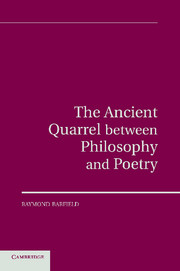Book contents
- Frontmatter
- Contents
- Acknowledgments
- Introduction
- 1 Socrates, Plato, and the Invention of the Ancient Quarrel
- 2 Aristotle, Poetry, and Ethics
- 3 Plotinus, Augustine, and Strange Sweetness
- 4 Boethius, Dionysius, and the Forms
- 5 Thomas and Some Thomists
- 6 Vico's New Science
- 7 Kant and His Students on the Genius of Nature
- 8 Hegel and the Owl of Minerva
- 9 Kierkegaard: A Poet, Alas
- 10 Dilthey: Poetry and the Escape from Metaphysics
- 11 Nietzsche, Heidegger, and the Saving Power of Poetry
- 12 Mikhail Bakhtin and Novelistic Consciousness
- Index
- References
7 - Kant and His Students on the Genius of Nature
Published online by Cambridge University Press: 03 May 2011
- Frontmatter
- Contents
- Acknowledgments
- Introduction
- 1 Socrates, Plato, and the Invention of the Ancient Quarrel
- 2 Aristotle, Poetry, and Ethics
- 3 Plotinus, Augustine, and Strange Sweetness
- 4 Boethius, Dionysius, and the Forms
- 5 Thomas and Some Thomists
- 6 Vico's New Science
- 7 Kant and His Students on the Genius of Nature
- 8 Hegel and the Owl of Minerva
- 9 Kierkegaard: A Poet, Alas
- 10 Dilthey: Poetry and the Escape from Metaphysics
- 11 Nietzsche, Heidegger, and the Saving Power of Poetry
- 12 Mikhail Bakhtin and Novelistic Consciousness
- Index
- References
Summary
Before winning his final post in philosophy at the University of Königsberg, Immanuel Kant was offered the position of professor of poetry in Berlin in 1764, which he turned down. Throughout his work, from his early observations on social habits and stories of ghosts to his final unfinished work full of notions about a priori matter, etymology, and recipes for the day, Kant always appears as a mind sorely tempted to go beyond what he viewed as “the boundaries of reason.” He was unrelentingly disciplined in the face of this temptation, but the nature of his temptation was revealing. Regarding spirits, for example, he said, “I confess that I am much inclined to affirm the existence of immaterial natures in the world, and to place my own soul in the class of these beings.” But soon after this comment he tempered his inclination, saying clearly that “the appeal to immaterial principles is the refuge of a lazy philosophy” (Dreams, II, 331).
While he was establishing the firm boundaries of his island of truth, Kant knew the temptations and the dangers of sailing far from the shores and into the fog, and so he was at times scathing in his rejoinders. In his early book Dreams of a Spirit Seer, a book written to refute the spiritualist claims of Swedenborg, who said he could see action from a distance, in far away cities, for example, Kant said that “the realm of shades is the Paradise of visionaries” (Dreams, II, 317).
- Type
- Chapter
- Information
- The Ancient Quarrel Between Philosophy and Poetry , pp. 148 - 167Publisher: Cambridge University PressPrint publication year: 2011

